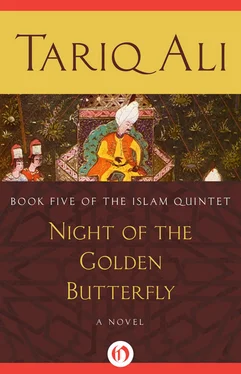Naughty had given Zaynab a detailed version of exactly what had happened to her. She had named names. The name of the charming young Frenchman, fluent in Urdu, Pashto and Persian, who had first established contact with her after General Rafiq was killed; the names of his colleagues at the embassies in Kabul and Isloo, who had informed her that her life was no longer safe. They had intercepted secret messages and the terrorists had even hired a hit man to kill her. Later she thought this couldn’t be true, since she had, unwittingly, done the insurgents a favour. They had hated Rafiq. But by then it was too late: she was already settled in a hideout near Rambouillet, receiving crash courses in French and elocution lessons to improve her English. At least she would never regret that side of the operation.
Then M. Bertrand entered the transcripts in the guise of her creepy television tutor. He taught her the tricks of his trade and while doing so made a sudden pre-emptive strike on the poor mammaries. She fended him off, but he never apologized, just shrugged as if to say, I’m a Frenchman and you know we all love women. She wasn’t unused to behaviour of this sort in Fatherland, but the comparison between her favourite military lover and Bertrand would certainly not enhance the latter’s reputation.
If her account wasn’t simply a set of prudent falsehoods, then the principle reason why she agreed to the entire operation was financial. She had already netted a million dollars for the book and hadn’t had to write a single word except for her signature on the contract drawn up by her agent. The book was the result of a collaboration between a well-known Fatherland journalist and her French counterpart. They were paid for that only, but with the collateral money she had coming, Naughty confided to Zaynab, by the end of the year she expected to net a cool two million euros. This would enable her to live independently wherever she chose and perhaps even create the basis for a reconciliation with her sons, whom she now wanted to educate abroad.
It was a situation in which morality had played no part on any side. Personally, I doubted whether it would be possible for Naughty to live in Fatherland again after all the publicity, but stranger things happen all the time and, who knew, perhaps Zaynab’s interview might help, but only if the new book caused the scandal we hoped for.
Many people today know all about these goings-on, yet literary and other hacks fall into line without a word of protest, concealing reality under a veneer of fine words like ‘civilization’, ‘freedom of speech’, etc. Of those who are willing to write the truth, most reveal only a very small part of it, masking their revelations with such obscure metaphors and ambiguous language that the end result is tedious to decipher even for those of us who know; for others, it is simply unreadable. There is more than one deadly plague raging in the world today, but few can call the ills that beset us by their right names.
Zaynab was working on her manuscript, and I was getting restless. She had some way to go. The interview had been conducted in a mixture of Urdu and English, and now had to be cleaned up and translated into French, after which Henri would read it and decide its fate. Meanwhile Zahid had e-mailed me saying he was back and wondering whether we might meet up one of these weeks. The present seemed as good a time as any. Zaynab protested feebly, then agreed, insisting only that she wanted me present when Naughty came for a meal next weekend, after returning from her triumphal tour of that Mother of all Fatherlands that is the United States of America. I promised not to miss this key G2 summit, the conference of two new authors. She hurled a sandal in my direction.
The next day I went to see Zahid and met Neelam, who had arrived for a short stay with her children. She looked at me curiously, but was perfectly pleasant. I made my condolences. The children said salaams. The mouthwatering scents emanating from the kitchen were from the meal she was preparing for all of us. Zahid and I went for a walk in Richmond Park.
On Confucius there was still no positive news. He remained in a confused state. Zahid had left China soon after seeing Suleiman in Kunming. His son was thriving and showed little interest in returning to the world of finance, which had already provided him with sufficient wealth to live without lifting a finger for the next twenty years. He was deeply immersed in history and was studying various phases of the Chinese Empire after the sixteenth century. Jindié was in Beijing for the duration. She couldn’t leave her brother, and Confucius had a large apartment where both he and his wife had made Jindié very welcome. It was obvious that Zahid, a provincial Punjabi to the core, did not really wish to discuss China. He was worried about Fatherland.
‘But we’re always worried about Fatherland. Has there ever been a time when we were not?’
He insisted that in our youth we had had high hopes and that in retrospect all those summers in Nathiagali during the Fifties and Sixties didn’t seem so bad. I reminded him that while we were mooning after girls in the mountains, radical students we knew were having icicles shoved up their backsides, political leaders and poets were in prison and the debacle of East Fatherland was hovering in the background.
He agreed. ‘But compared to later…’
‘If we get into relative values, old friend, we’re sunk. I mean you and me. The country’s already down there.’
‘You heard about Jamshed?’
I nodded. Our quondam friend had bought his way to high office and then been gunned down by a gang hired by the father of a young woman that both he and his son had raped. Jamshed was dead. The son was holed up in Dubai. Some newspapers maintained it was the terrorists, but nobody believed them.
‘Did you feel anything? Be honest.’
I shook my head. ‘Nothing at all. I was indifferent. Compared with Plato he was worth less than a pigeon dropping.’
‘Same here. And yet, this was a guy who was constantly in our company, Dara.’
‘Half a century ago and in another country.’
‘Old friendships die, but some can be revived.’
‘Like ours. Though had we been friends at the time of your Republican deviation, harsh words might have been exchanged.’
‘Had we been in touch and close, that deviation might never have happened. It was herd instinct. Jindié nearly left me over that and the kids became angry and alienated. It was a blip. Nothing serious.’
‘And operating on Cheney?’
‘Don’t you start…’
We started laughing. Then I reverted to the days of our youth and demanded a complete account of life with Jindié. At first he resisted, but the magic of the Punjabi language got to him and he began to talk. Most of it I knew from both of them, but he was frank. The relationship had worked on many levels but never physically. He had no idea why, but he was sure it would have the same with me or anyone else. Women who enjoy sex can enjoy it in different ways with different men. Obviously, he argued, it is more intense with someone you love. The opposite holds true, too. Some women don’t enjoy making love.
‘I’m sad to hear that, Ziddi…’
‘It’s the first time you’ve called me that in almost fifty years.’
‘Did you ever ask her why?’
‘Did you?’
I was slightly taken aback. ‘How could I?’
‘I think you could and should. She might tell you if there’s anything to tell. I had always assumed that all young women are waiting for passionate love, but Jindié wasn’t one of them.’
‘Dai-yu,’ I muttered.
Zahid was familiar with the novel. Jindié had forced him to read it in the early days of their marriage, and he had enjoyed doing so. He still thought of that novel. ‘And please don’t say it’s the only novel I’ve ever read. In case you’re interested, I even read one by you. Even though it was set way back in the past, I thought I recognized some old friends.’
Читать дальше












